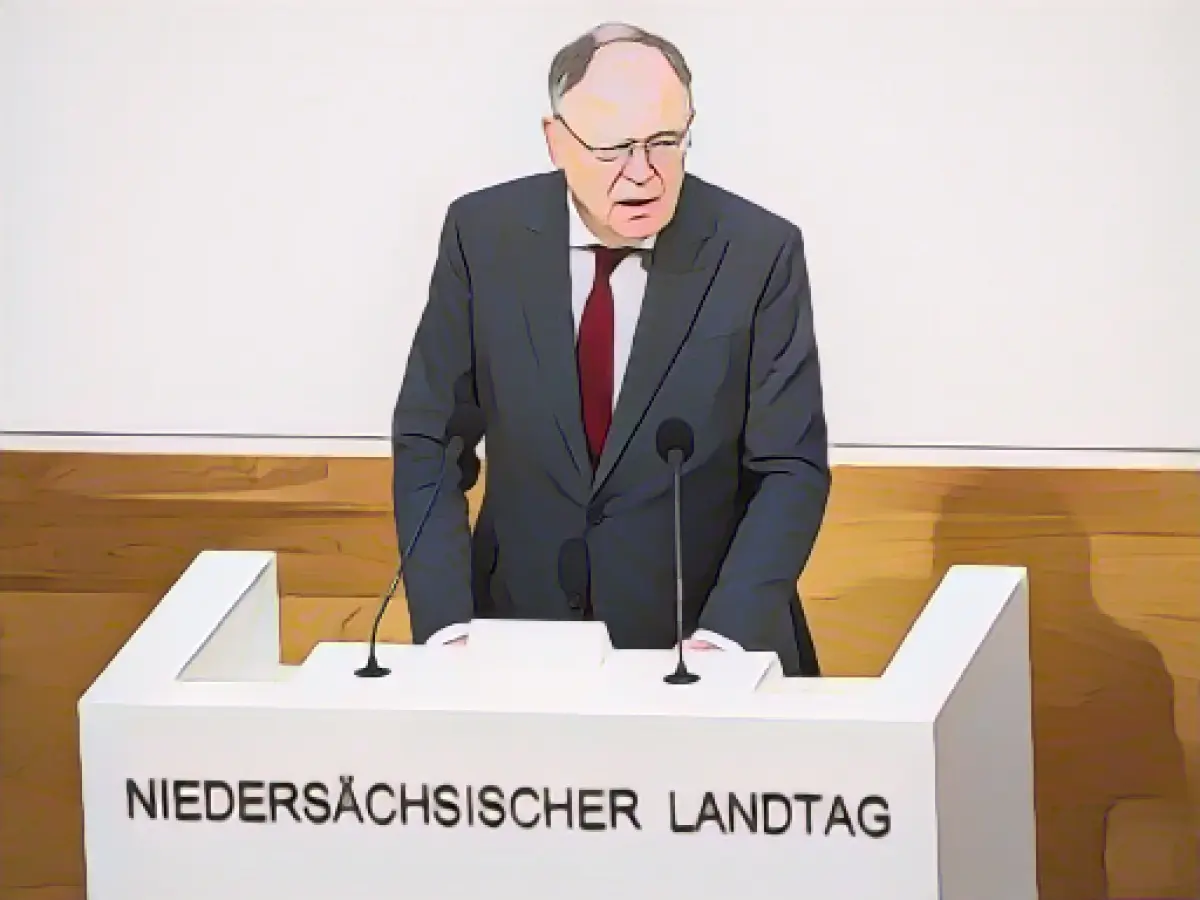After the Climate Fund Ruling: Weil Urges Against Funding Cuts Warning
German politician Stephan Weil, Lower Saxony's Minister President, has warned against cutting funding for companies already promised in light of the Karlsruhe ruling on the climate fund. In a stern statement during the 13th Lower Saxony Business Day in Hanover, Weil expressed concern that any reduction of funding would plunge Germany's budding business landscape into disarray. "If there's a serious question as to whether the promised funding will actually materialize, then it'll be a mess," said Weil on Wednesday. "Germany's reputation as a thriving business hub must not be jeopardized."
The prohibition, handed down last week by the Federal Constitutional Court, bars the federal government from using loans totaling 60 billion euros for the climate fund. Numerous projects aimed at bolstering the economy, which were to receive financing from this fund, teeter on the brink of collapse. Steadfast in his commitment, Economics Minister Olaf Lies promised on Wednesday to safeguard the funding the state had pledged.
Mental shift required in federal spending policies
Andreas Jäger, the President of Lower Saxony Business Associations (UVN), which organized the event, urged the federal government to reconsider its budgetary strategy. Jäger argued that the federal government needed to overhaul its financial policy in the aftermath of the ruling if it wanted to sustain overall economic growth. "If the federal government seeks to keep stimulating overall economic growth in the wake of the ruling, state consumer spending must shrink," he stated. "When resources are dwindling, politicians must determine priorities and make their choices clear."
Weil underscored the urgency of steering Germany towards energy-efficient industries, highlighting the critical window of opportunity open for shaping the future. "We're currently in a pivotal phase where future prospects are being allocated. The claims are being divvied up now – not in 10 years’ time," he stressed.
Bright prospects for a renewable energy future in Lower Saxony
More than 300 political and business leaders convened to discuss the country's energy transition, the transformation to climate-neutral production, and the escalating energy costs affecting Germany's industrial landscape. Weil expressed optimism for the role that Lower Saxony could play in renewable energy production, aiming to position the state as a leading provider of clean energy throughout Germany.
Though progress is evident, significant hurdles remain
Bärbel Heidebroek, Chairwoman of the State Association for Renewable Energies (LEE), acknowledged that Germany still faced considerable obstacles in achieving its climate objectives, particularly in the transport, building, and agricultural sectors. Despite a notable increase in wind turbines, the state remains far from meeting its overall goals.
Christian Meyer, Lower Saxony’s Energy Minister, identified the erection of one new wind turbine per day as an attainable goal to propel the state towards its climate targets. According to Meyer, the state already has more wind turbines than any other German federation.
The Industrial Sector: Challenges Ahead
The ruling presents a potential challenge for industries affected by the climate fund's funds, as the continuity of promised support is vital to maintaining trust in Germany as an attractive business destination.
Source:
Enrichment Data:
Germany's Federal Constitutional Court's ruling on the Second Supplementary Budget Act 2021, which classified tens of billions of euros earmarked for climate and transition projects as unlawfully budgeted, has significant implications for funding and Germany's budget, as follows:
Current Reality
- Governmental strife:
- The ruling sparked political unrest, leading to German coalition government collapse and provisional spending until the new government is inaugurated, potentially as late as mid-2025.
- Economic uncertainty:
- The turmoil stems against the backdrop of escalating economic concerns, such as a waning manufacturing industry, a contracting workforce, and apprehensions about the future of major companies like Volkswagen (VW), which publicly announced its intention to slash 35,000 jobs by 2030.
- Climate objectives:
- Despite challenges, Germany remains close to reaching its 2030 national goal of reducing total greenhouse gas emissions by 65%. However, it continues to grapple with achieving EU limitations in sectors such as transportation, buildings, and agriculture.
Future Changes
- Financing adaptation challenges:
- The incoming government needs to address adaptation financing liabilities for climate changes. Although the federal government mandates risk assessments and implementation of response measures, a joint financing mechanism between the federal government and local authorities remains unavailable.
- Municipal financing issues:
- Municipalities experience financial limitations in executing climate adaptation projects. A survey indicates that most municipalities anticipate increasing exposure to extreme weather events by 2050 but lack necessary resources to finance appropriate responses. If the necessary constitutional amendment materializes, the federal government could provide persistent financial support for climate adaptation.
- Securing chronic funding
- Researchers, environmentalists, and trade unions advocate for a constitutional amendment to perpetually provide long-term funding for climate adaptation. Initially discussed during Chancellor Olaf Scholz's term, ultimate implementation fell through, necessitating a successful reform to force the federal government and federal states to supply persistent funding alongside short-term initiatives.
In summary, the ruling has caused uncertainty in Germany's financial and climate funding policies. A new government must address adaptation financing challenges, work towards securing long-term funding through constitutional amendments, and tackle the financial impediments faced by municipalities to effectively implement climate adaptation measures.








